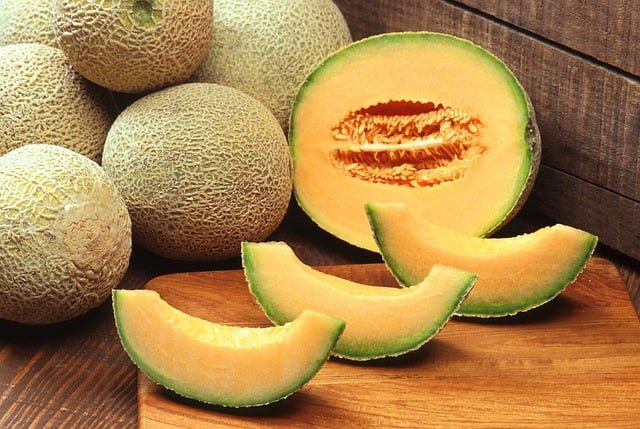Tortoises are herbivores and eat a variety of fruits and vegetables. However, not all fruits and vegetables are safe for them to consume. Cantaloupe is a popular fruit among humans, but can tortoises eat cantaloupe? In this article, we will explore whether cantaloupe is a safe and healthy food for tortoises to eat.
Cantaloupe is a good source of vitamins A and C, as well as potassium and fiber. These nutrients are essential for a healthy diet, but do they benefit tortoises as well? While tortoises do require a balanced diet, not all fruits and vegetables are suitable for their digestive system. In the next section, we will examine the nutritional needs of tortoises and whether cantaloupe meets those requirements.

Understanding Tortoises’ Dietary Needs
As tortoise owners, we must understand the dietary needs of these creatures to ensure that they stay healthy and happy. Tortoises are herbivores, which means that they only eat plants. Their diet should consist of a variety of fresh vegetables, fruits, and grasses.
One essential aspect of a tortoise’s diet is calcium. Calcium is essential for healthy bone growth and development. Tortoises require a diet that is high in calcium to prevent metabolic bone disease. We can provide calcium to our tortoises by offering them a variety of calcium-rich foods such as kale, collard greens, and dandelion greens.
Another crucial aspect of a tortoise’s diet is fiber. Tortoises require a diet that is high in fiber to maintain a healthy digestive system. We can provide fiber to our tortoises by offering them a variety of leafy greens, hay, and grasses.
When it comes to feeding our tortoises fruits, we must be careful not to overdo it. Fruits are high in sugar, which can lead to health problems such as obesity and diabetes. We can offer our tortoises fruits as a treat, but it should not make up a significant portion of their diet.
In conclusion, understanding the dietary needs of our tortoises is essential for their health and well-being. We must provide them with a diet that is high in calcium and fiber while being mindful of the amount of fruit we offer them. By following these guidelines, we can ensure that our tortoises live a long and healthy life.
Cantaloupe and Tortoises: A Basic Overview
When it comes to feeding tortoises, it’s important to know what foods are safe and healthy for them. One common question that arises is whether or not tortoises can eat cantaloupe. In this section, we’ll provide a basic overview of cantaloupe and its potential benefits and risks for tortoises.
Cantaloupe is a type of melon that is high in vitamins A and C, as well as potassium and fiber. These nutrients can be beneficial for tortoises, as they can help support a healthy immune system and digestive function. However, it’s important to note that cantaloupe should be fed to tortoises in moderation.
While cantaloupe is generally safe for tortoises to eat, it’s important to consider the sugar content of the fruit. Excessive sugar intake can lead to health issues such as obesity and diabetes in tortoises. Therefore, it’s recommended to feed cantaloupe to tortoises as an occasional treat rather than a regular part of their diet.
When feeding cantaloupe to tortoises, it’s important to remove the seeds and rind before offering the fruit. The seeds can be a choking hazard, while the rind is difficult for tortoises to digest. Additionally, it’s important to offer cantaloupe in small pieces to prevent the tortoise from overeating.
In summary, cantaloupe can be a healthy and tasty treat for tortoises when fed in moderation. However, it’s important to consider the sugar content and to remove the seeds and rind before offering the fruit.
Nutritional Value of Cantaloupe
Cantaloupe is a delicious fruit that is loved by many, including tortoises. It is a good source of essential vitamins and minerals that are important for maintaining good health. In this section, we will take a closer look at the nutritional value of cantaloupe.
Vitamins
Cantaloupe is an excellent source of vitamins A and C. Vitamin A is important for maintaining healthy eyesight, skin, and immune system. It also plays a role in bone growth and development. Vitamin C is an antioxidant that helps protect the body against damage from free radicals. It is also important for maintaining healthy skin, bones, and connective tissues.
Minerals
Cantaloupe is also a good source of potassium and magnesium. Potassium is important for maintaining healthy blood pressure and heart function. It also plays a role in muscle function and nerve transmission. Magnesium is important for maintaining healthy bones, muscles, and nerves. It also plays a role in energy metabolism and protein synthesis.
Other Nutrients
Cantaloupe is also a good source of dietary fiber, which is important for maintaining good digestive health. It is also low in calories, making it a great option for those who are watching their weight.
Overall, cantaloupe is a nutritious fruit that can provide a range of health benefits. When feeding cantaloupe to your tortoise, be sure to cut it into small pieces and remove any seeds or rind. As with any food, it should be fed in moderation as part of a balanced diet.

Benefits of Cantaloupe for Tortoises
Hydration
Cantaloupes are an excellent source of hydration for tortoises. The fruit is made up of 90% water, which can help keep your tortoise hydrated and healthy. Dehydration can be a serious issue for tortoises, and providing them with fruits like cantaloupe can help prevent it.
Vitamin Intake
Cantaloupes are also a great source of vitamins for tortoises. They contain high levels of vitamin A, which is essential for maintaining healthy eyesight, skin, and shell. Additionally, cantaloupes are rich in vitamin C, which can help boost your tortoise’s immune system and protect them from illness.
It’s important to note that while cantaloupes can be a healthy addition to your tortoise’s diet, they should be fed in moderation. Too much fruit can lead to digestive issues and other health problems. As always, it’s best to consult with a veterinarian or reptile specialist to determine the appropriate diet for your tortoise.
Potential Risks of Feeding Cantaloupe to Tortoises
Sugar Content
Cantaloupe is a fruit with a high sugar content. While it may be a tasty treat for humans, it can be harmful to tortoises if fed in excess. Tortoises are herbivores and their digestive systems are not designed to handle large amounts of sugar. Overconsumption of sugar can lead to obesity, diabetes, and other health issues in tortoises. Therefore, it is important to limit the amount of cantaloupe given to tortoises and only offer it as an occasional treat.
Digestive Issues
Feeding cantaloupe to tortoises can also cause digestive issues. The high sugar content can disrupt the balance of bacteria in the tortoise’s gut, leading to diarrhea, bloating, and other digestive problems. Additionally, the tough outer layer of the cantaloupe can be difficult for tortoises to digest, potentially causing blockages in their digestive tract. To avoid these issues, it is recommended to only offer small amounts of cantaloupe to tortoises and remove any seeds or tough outer layer before feeding.
In conclusion, while cantaloupe can be a tasty treat for tortoises, it should be given in moderation and with caution. The high sugar content and potential digestive issues make it important to limit the amount of cantaloupe offered and to prepare it properly before feeding. As always, it is important to consult with a veterinarian before introducing any new foods to your tortoise’s diet.
How to Safely Feed Cantaloupe to Tortoises
Portion Size
When feeding cantaloupe to tortoises, it is important to remember that moderation is key. While cantaloupe can be a healthy and tasty treat for your tortoise, it should not make up a significant portion of their diet. We recommend offering cantaloupe as a small treat, no more than once or twice a week.
The portion size should be appropriate for the size of your tortoise. As a general rule, the portion size should be no larger than the size of your tortoise’s head. This will help prevent overfeeding and ensure that your tortoise is getting a balanced diet.
Frequency
As mentioned above, cantaloupe should be offered as a treat, not a staple food. We recommend feeding cantaloupe to your tortoise no more than once or twice a week. Overfeeding can lead to digestive problems and obesity, which can be harmful to your tortoise’s health.
Preparation Methods
Before feeding cantaloupe to your tortoise, it is important to prepare it properly. First, wash the cantaloupe thoroughly to remove any dirt or debris. Then, cut the cantaloupe into small, bite-sized pieces that are easy for your tortoise to eat.
It is important to remove the seeds and rind from the cantaloupe before feeding it to your tortoise. The rind can be tough and difficult for your tortoise to digest, while the seeds can be a choking hazard.
In conclusion, cantaloupe can be a healthy and tasty treat for your tortoise when offered in moderation. Remember to keep portion sizes small, offer cantaloupe no more than once or twice a week, and prepare it properly by removing the seeds and rind.
Conclusion
Based on our research, we conclude that tortoises can eat cantaloupe in moderation. Cantaloupe is a safe and nutritious treat for tortoises when given in small amounts as part of a balanced diet.
While cantaloupe is high in sugar, it also contains important vitamins and minerals that can benefit a tortoise’s health. However, it is important to remember that tortoises have different dietary needs than humans and other animals. Too much cantaloupe or any other fruit can upset a tortoise’s digestive system and cause health problems.
When feeding cantaloupe to a tortoise, it is important to remove the seeds and rind. The seeds can be a choking hazard and the rind is difficult for a tortoise to digest. Cut the cantaloupe into small pieces and offer it as a treat a few times a week.
In conclusion, cantaloupe can be a healthy addition to a tortoise’s diet when given in moderation. As with any new food, it is important to introduce it slowly and monitor your tortoise’s reaction. If your tortoise shows signs of digestive upset or other health problems, stop feeding cantaloupe and consult with a veterinarian.

Frequently Asked Questions
What fruits are safe for tortoises to eat?
Tortoises are herbivores and can eat a variety of fruits and vegetables. Safe fruits for tortoises include strawberries, raspberries, blueberries, apples, pears, and cantaloupes.
Are cantaloupes a good source of nutrition for tortoises?
Cantaloupes are a good source of nutrition for tortoises. They are high in vitamins A and C, and also contain potassium and fiber.
How often should I feed my tortoise cantaloupe?
Cantaloupe should be fed to tortoises in moderation. It is recommended to feed them small amounts once or twice a week.
Can tortoises eat other types of melon besides cantaloupe?
Yes, tortoises can eat other types of melon such as honeydew and watermelon. However, like with cantaloupe, they should be fed in moderation.
What are the potential risks of feeding cantaloupe to tortoises?
Feeding too much cantaloupe to tortoises can cause diarrhea and other digestive issues. It is important to feed them in moderation and to not make it a regular part of their diet.
Do tortoises enjoy eating cantaloupe?
Tortoises may enjoy eating cantaloupe, but it is important to not overfeed them. They should have a balanced diet that includes a variety of fruits and vegetables.




